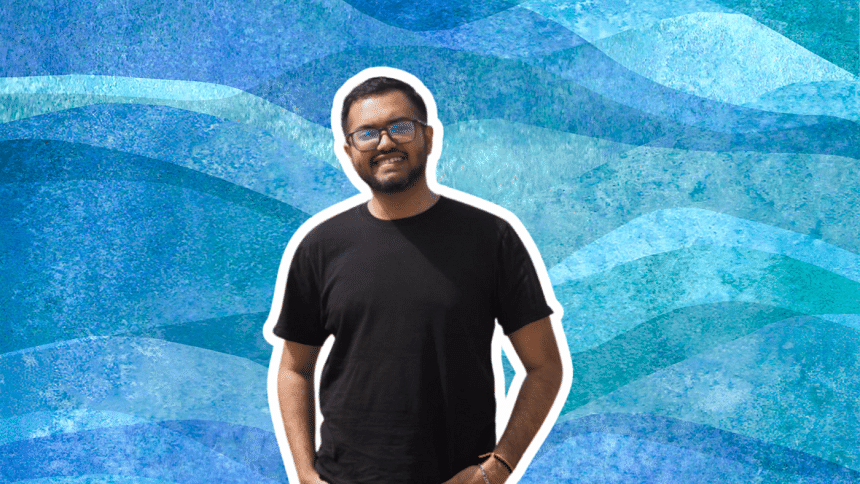A peek inside Hasibul's journey of community-driven freshwater conservation

The National Geographic Society and The Nature Conservancy have recently awarded Hasibul Hasan Ahmed, a final-year Computer Science and Engineering student at Brac University, a US$2,000 seed grant for his research externship on 'Community and Conservation'. Hasibul's project focuses on revitalising Dhaka's Banani Lake and the Korail slum in Dhaka through a community-driven freshwater conservation effort. In an exclusive interview, we dive into Hasibul's journey so far, details about his externship, and the passions that drive him to save the environment in this rapidly changing modern world.
Congratulations on receiving the grant. Could you describe your project and its primary objectives?
The project is mainly focused on primary research I conducted during my two-month externship at the National Geographic Society and The Nature Conservancy's collaboration on Fresh Water Conservation and Community. Back then, I started a philanthropic, cause-driven research training program for inspiring water conservationist efforts among students. It ended up being a 25-hour effort-driven research of the Korail community, focusing on the conservation of the Banani Lake.
Afterwards, students of the program confessed their interest in continuing the research, which led me to create EcoFlow Revive, a community-driven project to preserve Banani Lake, in collaboration with the Social Impact Lab at BRAC University. Other than cleaning the lake, our goal is to motivate the Korail community in freshwater conservation by promoting behavioural change: starting from educating school students in the community hubs.
How did you manage the externship? Did you apply for it?
The research-based externship on 'Global Freshwater and Community Conservation' by the National Geographic Society and The Nature Conservancy, powered by Paragon One, is for undergraduate students aged 18 to 25. Students who have had leadership capacity, prior research knowledge, and interest in conservationist efforts can apply for the position, and find the externship on the Paragon One website. I am also a student ambassador for the recruitment process now, so anybody interested can reach out to me if they want to apply.
I was selected for the externship mainly because I had prior accolades that helped me pass their rigorous recruitment of a three-step process: application submission, a recorded prompt-based interview, and a remote online interview. Those who complete this externship become eligible to pitch their idea to promote conservationist projects and in turn, receive seed funds for their community project.
Besides your education, what else are you involved with?
I am the co-founder of Social Impact Lab at BRAC University, a student-led organisation that empowers students to be social entrepreneurs by co-creating solutions together. I am also an alumnus of the Aspire Leadership Program founded at Harvard University, an alumnus of the UN Millennium Fellowship Class of 2022, and a Global Fellow at the Open Society University Network.
What inspired you to initiate this project and focus on freshwater conservation?
My primary focus was to contribute back to the community where our old campus of BRAC University used to be. After we shifted to the new campus, my intuition aligned with my mindset. Applying for the grant helped me create a way to support the community of Korail, and the research-based externship inspired me to focus on freshwater conservation.
How do you envision this grant contributing to the success and impact of your conservation efforts?
The grant is basically to inspire young conservationists to support them in their academic pursuits and help them quickly start their civic engagement projects. It is a small contribution to our long-term plan to sustainably restore Banani Lake and create a resource of fresh water and green vegetation.
We are looking forward to adding more funds and creating an awareness hub for water conservation. We are also planning on creating a prototype of the outcome of our primary research, which promises a short-term SODIS disinfection model to attain clean water. With the support of the government and NGOs, we are hoping to establish a long-term sustainable water purifying hub as well.
What are the major challenges you expect to face while executing this conservation project, and how do you plan to address them?
The freshwater conservation project is going to be implemented in the Korail community with the incorporation of the Social Impact Lab at BRACU and other local NGOs. However, the major problem in this community-driven project is money constraints. The fund is little to nothing to fulfil the goal of the project. However, getting funding from world-recognised organisations like the National Geographic Society already reflects the strength of the project, which can potentially attract philanthropists to invest more in this goodwill.
Community involvement is often crucial in conservation projects. How will you engage local communities or stakeholders in your freshwater conservation initiatives?
Our primary focus is to engage the community in conservation because otherwise, even if we clean the lake and create ways to sustainably maintain an ecosystem, people will throw dumps and trash in the lake and use it as a canal anyway. So, to address this, we are in touch with six schools in the community and jointly designing awareness materials and playful activities that will influence adolescents to be engaged in the agenda. We are also planning to reach out to the locals through mosque imams and health volunteers, and also create a water committee with the help of local leaders to sustainably create recurring awareness.
Long-term sustainability is a crucial aspect of conservation efforts. How do you plan to ensure the continuity and sustainability of your project's impact beyond the grant period?
As already stated, we are looking for more grants. However, one of the co-founders of the project, Lamisa Manha, recently won the Climate Innovation Challenge supported by UNDP Bangladesh and Columbia Business School. She got us in touch with a company called TRACA that works with carbon trading, which has shown interest in creating a sustainable long-term partnership with us.
What message or advice would you give to aspiring conservationists or individuals passionate about freshwater conservation?
Altruist mindset and philanthropist cause won't be enough to diligently work on such a crucial, nationwide problem. Aspiring conservationists should first gain vital knowledge and practice research if they want to persistently pursue freshwater conservation or any other conservationist career. However, possibilities are wide and doors are open everywhere. You need to keep co-creating positive viable solutions and knocking on doors to eventually find success in this field.

 For all latest news, follow The Daily Star's Google News channel.
For all latest news, follow The Daily Star's Google News channel. 








Comments